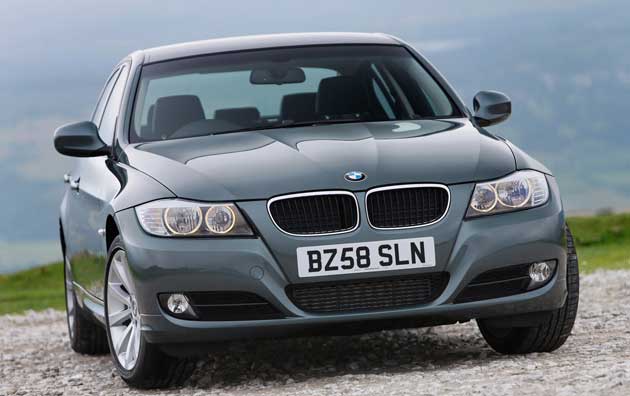BMW 330d M Sport

Price: £33,885
Top speed: 155 mph 0-60mph 6.1 seconds
Consumption: 49.6 mpg
CO2 emissions: 152g/km
Best for: Compact execs
Also worth considering? Alfa Romeo 159, Audi A4, Mercedes Benz C Class
The German language has a reputation for being long-winded but there are some rare examples of pithy German expressions that are shorter than their English equivalents. One of these is the so-called "Luxusproblem" – literally "luxury problem" – which corresponds to our notion of "a nice problem to have".
In today's tough conditions where real problems are plentiful, BMW must be one of the few car-makers still to enjoy the "Luxus" variety. The first 3-Series "compact executive" cars arrived in 1975 and over the years, the same basic recipe – rear-wheel drive, sporty handling, a small saloon body and zippy engines – has been honed pretty much to perfection. Although the first 3 lasted nine years, subsequent generations have arrived every seven years.
Halfway through each seven-year cycle, somebody in Munich has to decide the precise mix of mid-life tweaks and adjustments to be applied to this fabulously successful product in order to keep it fresh. It scarcely needs to be said that most other motor industry executives would also regard this as a very nice problem to have.
The present 3 has just emerged from such an update and the external alterations are predictably modest. The big changes are all under the skin; in particular the 330d M Sport featured here has a new 3-litre diesel engine capable of punching the 3 to 60 in six seconds and an artificially limited top speed of 155 mph.
Now for the really impressive bit: for a couple of years, BMW has been applying its EfficientDynamics programme of energy-saving measures across its range. In the case of the 330d, these include Brake Energy Regeneration, electric power steering and Intelligent Alternator Control, and these help the car to a combined-cycle fuel consumption of 49.6mpg and CO2 emissions of 152g/km, remarkable figures of the sort you'd normally expect from a cheap little runabout rather than a powerful BMW.
Until about 10 years ago, buyers of German premium models faced a luxury problem of their own: BMW and Mercedes sold basic cars and customers had to pay for lots of pricey optional equipment to make them habitable. That's since been fixed and now it's only the 3's slightly cramped accommodation that can really be held against this impressive product.
Subscribe to Independent Premium to bookmark this article
Want to bookmark your favourite articles and stories to read or reference later? Start your Independent Premium subscription today.

Join our commenting forum
Join thought-provoking conversations, follow other Independent readers and see their replies